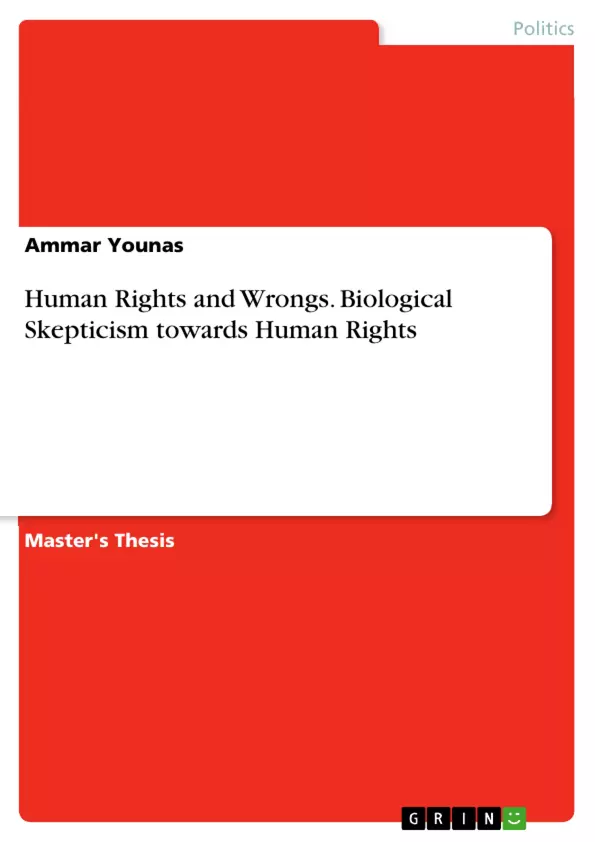This thesis is an attempt to provide an adequate theoretical framework to understand the biological basis of human rights. We argue that the skepticism about human rights is increasing especially among the most rational, innovative and productive community of intellectuals belonging to the applied sciences. By using examples of embryonic stem cell research, humanoid robotics and artificial intelligence, a clash between applied scientists and legal scientists cum human rights activists has been highlighted. International human rights regimes notably UN bodies are writing declaration after declaration related to the issues, which are purely of biological nature such as bioethics, human genome, genetic engineering and human cloning. Because of these declarations, applied scientists have fed up of human rights and can justifiably reject them as a whole considering them alien to scientific culture and hence saying that they are unable to find local normative validity of human rights inside the scientific community. After an extensive literature review, this thesis concludes that advances in applied sciences proven by empirical evidences should not be restricted by normative theories and philosophies of the social scientists who often take part in drafting of legal documents such as UN Declarations. Whereas biology can provide a framework of cooperation for social and applied scientists.
Inhaltsverzeichnis (Table of Contents)
- CHAPTER 1 INTRODUCTION
- CHAPTER 2
- 2.1 HUMAN RIGHTS SKEPTICISM.
- 2.1.1 HUMAN RIGHTS SKEPTICISM AND CASES FROM APPLIED SCIENCES
- 2.1.2 STEM CELL RESEARCH AND HUMAN RIGHTS SKEPTICISM.
- 2.1.3 ARTIFICIAL INTELLIGENCE AND HUMAN RIGHTS SKEPTICISM
- 2.1 HUMAN RIGHTS SKEPTICISM.
- CHAPTER 3
- 3.1 HUMAN RIGHTS SKEPTICISM AND CASES FROM SOCIAL SCIENCES
- 3.1.1 FAILURE OF SOCIAL CONTRACT.
- 3.1.2 PHILOSOPHICAL PROGRESS, STATE OF NATURE AND SOCIAL CONTRACT
- 3.1.3 INDIVIDUALISM OF HUMAN RIGHTS VS SOCIALISM OF HUMAN RIGHTS IN SOCIAL CONTRACT
- 3.1 HUMAN RIGHTS SKEPTICISM AND CASES FROM SOCIAL SCIENCES
- CHAPTER 4
- 4.1 HUMAN RIGHTS AND WRONGS WITH UN DECLARATIONS
- 4.1.1 CUSTOMARY LAWS IN MEDICAL SCIENCES VS INTERNATIONAL HUMAN RIGHTS REGIMES
- 4.1 HUMAN RIGHTS AND WRONGS WITH UN DECLARATIONS
Zielsetzung und Themenschwerpunkte (Objectives and Key Themes)
This thesis aims to explore the relationship between biological advancements and the concept of human rights, focusing on the growing skepticism towards human rights within the scientific community. The thesis argues that advancements in applied sciences, such as stem cell research, robotics, and artificial intelligence, challenge traditional human rights frameworks.
- The growing skepticism about human rights among scientists, particularly those in applied sciences.
- The clash between the perspectives of applied scientists and human rights activists on issues related to bioethics, human genome, and genetic engineering.
- The potential for biological advancements to challenge the foundations of human rights theory, such as the social contract.
- The need for a framework that fosters collaboration between social and applied scientists in addressing the ethical implications of biological advancements.
- The role of international human rights declarations in regulating biological research and its ethical implications.
Zusammenfassung der Kapitel (Chapter Summaries)
Chapter 1 introduces the thesis, setting the stage for exploring the relationship between biological advancements and human rights skepticism. Chapter 2 delves into the skepticism towards human rights arising from the applied sciences, examining specific cases like stem cell research and artificial intelligence. Chapter 3 explores the skepticism about human rights from the perspective of social sciences, focusing on the failure of the social contract and the philosophical underpinnings of human rights.
Schlüsselwörter (Keywords)
This thesis focuses on the complex interplay between human rights and biological advancements, exploring key concepts such as human rights skepticism, bioethics, stem cell research, artificial intelligence, social contract, and international human rights declarations. The work delves into the challenges posed by scientific advancements to traditional human rights frameworks and seeks to identify pathways for collaborative engagement between social and applied scientists.
Frequently Asked Questions
Why is there biological skepticism towards human rights?
Scientists in applied sciences often find legal human rights frameworks restrictive and alien to scientific culture, especially regarding innovative research.
How does stem cell research clash with human rights?
The ethical and biological nature of embryonic stem cell research often conflicts with normative theories and UN declarations drafted by social scientists.
Can Artificial Intelligence challenge human rights frameworks?
Yes, advancements in AI and robotics raise new questions about legal personhood and ethics that traditional human rights regimes struggle to address.
What is the critique of UN Declarations in this thesis?
The thesis argues that empirical evidence from applied sciences should not be restricted by the philosophical and normative theories often found in UN documents.
Is the "Social Contract" failing in the context of human rights?
The thesis explores the failure of the social contract from a social science perspective, questioning its local normative validity in the modern scientific community.
- Citation du texte
- Ammar Younas (Auteur), 2018, Human Rights and Wrongs. Biological Skepticism towards Human Rights, Munich, GRIN Verlag, https://www.grin.com/document/445441



